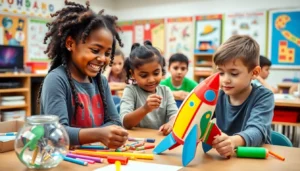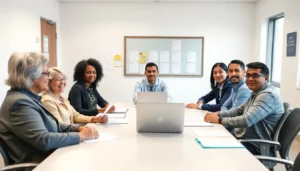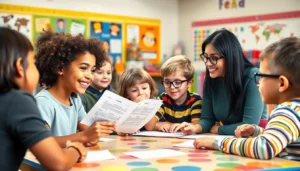Table of Contents
ToggleIn a world where traditional education often feels like a never-ending cycle of tests and textbooks, alternative education programs are shaking things up. They’re like the cool kids at school who break the mold, offering innovative and flexible approaches to learning that cater to diverse needs. Whether it’s experiential learning, homeschooling, or online platforms, these programs are redefining what it means to get an education.
Imagine a classroom where students explore their passions, collaborate on real-world projects, and actually enjoy the learning process. Sounds like a dream, right? But for many, it’s a reality. Alternative education programs empower learners to take charge of their education, making it not just a requirement but a thrilling adventure. So, let’s dive into the world of alternative education and discover how it’s transforming lives one curious mind at a time.
Overview of Alternative Education Programs
Alternative education programs offer various approaches that redefine traditional learning methodologies. These programs encompass experiential learning opportunities, homeschooling practices, and technology-driven online platforms. Flexibility characterizes these alternatives, allowing students to tailor their educational experiences according to individual interests and needs.
Experiential learning emphasizes real-world applications of knowledge. Students engage in hands-on projects, enabling them to apply theoretical concepts outside a classroom environment. This approach fosters critical thinking, problem-solving skills, and collaboration among peers.
Homeschooling provides families the autonomy to create personalized curriculums. Parents often design educational activities that align with their children’s strengths, interests, and learning styles. This one-on-one interaction can increase engagement and encourage deeper understanding of subject matter.
Online education platforms present another option for learners seeking alternative pathways. These platforms offer access to diverse courses and resources from the comfort of home. Students participate in interactive lessons and can progress at their pace. Research indicates that online education can improve retention and comprehension when used effectively.
Each of these alternative education programs allows students to pursue their passions. Learners engage with content that excites them, leading to more meaningful educational experiences. As interest in alternative education continues to rise, its positive impact on student motivation and learning outcomes warrants further examination.
Types of Alternative Education Programs
Alternative education encompasses various programs that cater to unique learning styles and needs. These programs prioritize personalized learning while fostering creativity and critical thinking.
Montessori Schools
Montessori schools emphasize student-led learning and hands-on experiences. Each classroom features mixed-age groups, allowing younger students to learn from older peers while older students reinforce their knowledge. Teachers act as guides, facilitating exploration rather than following a strict curriculum. The method encourages independence, promoting self-motivation in students. Activities often include practical life skills, sensory materials, and academic content integrated into everyday tasks.
Waldorf Education
Waldorf education prioritizes a holistic approach to learning, integrating arts, academics, and practical activities. Classrooms focus on fostering imagination through storytelling, crafts, and music, enhancing creativity and critical skills. Teachers follow a curriculum tailored to developmental stages, promoting emotional and intellectual growth. Outdoor playtime is vital, encouraging connection with nature. Communities often participate in seasonal festivals, strengthening social bonds and enhancing cultural understanding.
Online Learning Platforms
Online learning platforms offer flexibility by providing access to diverse courses and resources. Students can learn at their own pace through videos, quizzes, and interactive assignments. Popular platforms often include structured curricula or allow personalized course selection. Many online options cater to specific interests, such as technology, entrepreneurship, or the arts. This accessibility enhances retention and engages learners who thrive in non-traditional environments.
Benefits of Alternative Education Programs
Alternative education programs offer various advantages that cater to individual student needs and learning preferences. These benefits contribute to a well-rounded educational experience.
Personalized Learning
Personalized learning stands out as a key feature of alternative education. Students engage with tailored curriculums that align with their unique strengths and interests. Educators focus on learning styles, allowing for customized pathways that foster deeper understanding. This approach often leads to improved academic performance and higher student satisfaction. For example, a student who struggles with traditional methods may thrive in a program that emphasizes hands-on projects and real-world applications. Customized experiences ensure that every learner finds success on their educational journey.
Flexible Curriculum
Flexible curriculum design enhances the overall learning experience. Students can explore subjects at their own pace, allowing for deeper dives into topics of interest. This adaptability provides opportunities for self-directed projects that cater to individual passions. Moreover, the integration of various mediums such as online resources, workshops, and field trips keeps students actively engaged. Flexible programs often feature interdisciplinary approaches, blending subjects for a holistic view of learning. Such curriculum designs encourage critical thinking and make education a dynamic, interactive experience.
Enhanced Creativity
Enhanced creativity flourishes within alternative education frameworks. Students frequently work on innovative projects that stimulate imaginative thinking. Various activities, including artistic expression, collaborative problem-solving, and experiential learning, encourage students to think outside the box. Unlike traditional methods, these programs value exploration and experimentation, which cultivates original ideas. Engaging with diverse materials and formats allows students to discover new interests and passions. Creativity becomes a vital component of learning, driving curiosity and fostering a lifelong love for knowledge.
Challenges in Implementing Alternative Education Programs
Implementing alternative education programs faces several significant challenges that can hinder their effectiveness.
Funding and Resources
Funding poses a major obstacle for many alternative education programs. Limited financial support often prevents the acquisition of necessary materials, staff, and facilities. Many programs rely on grants or donations, which may not always be reliable or sufficient. Public funding frequently favors traditional schools, leaving alternative models under-resourced. Without adequate funding, these programs struggle to maintain quality and accessibility. Moreover, resource allocation impacts the ability to hire trained educators who can effectively implement innovative teaching strategies. Community partnerships may offer some relief, yet establishing these connections often requires time and effort that could otherwise be spent on educational programs.
Standardization Issues
Standardization applies only to traditional education systems; alternative programs often prioritize individualized learning approaches. As a result, developing standardized assessments remains complex. These programs may lack appropriate metrics to evaluate student progress, creating difficulties in measuring success. While standard tests evaluate certain knowledge areas, they may not reflect the diverse experiences gained through alternative methods. Resistance from educational authorities can further complicate implementation, as regulators may impose frameworks better suited to conventional models. Educators often grapple with aligning alternative curricula to state standards while striving to maintain their unique pedagogical principles. Balancing the need for accountability and flexibility becomes crucial for the sustainability of alternative education programs.
Alternative education programs are reshaping the landscape of learning by prioritizing student engagement and individualized approaches. These innovative methods empower students to pursue their passions and develop critical thinking skills through hands-on experiences and collaborative projects.
While challenges such as funding and standardization persist, the benefits of personalized learning and enhanced creativity cannot be overlooked. As more families and educators embrace these alternative pathways, the potential for transforming education into a dynamic and fulfilling journey becomes increasingly attainable. The future of learning lies in these diverse and adaptive educational models, paving the way for a more inclusive and effective system.






